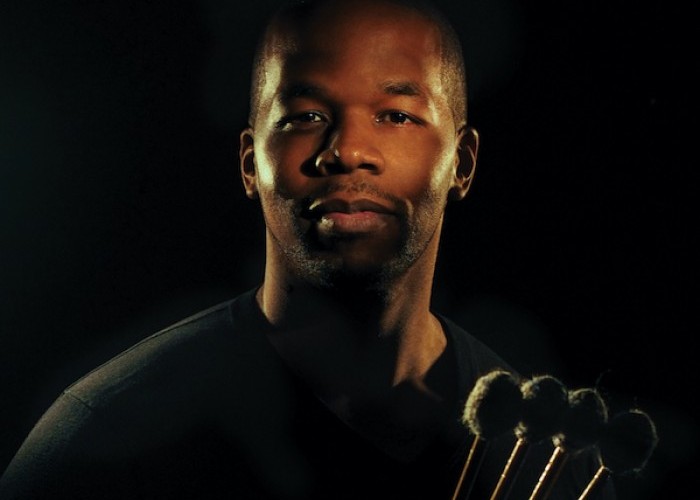Jan 13, 2026 2:09 PM
More Trump-Kennedy Center Cancellations
The fallout from the renaming of the John F. Kennedy Center for the Performing Arts to include President Donald…

Vibraphonist Warren Wolf wanted to do “something completely different” for his Mack Avenue album, Reincarnation.
(Photo: Steven Parke)There’s no question that Baltimore-bred vibraphonist Warren Wolf can swing. His previous three albums on Mack Avenue—stretching back to a self-titled 2011 effort—showcase his locked-in grooves, originality as an improviser and a sensitive, artful touch akin to masters Milt Jackson and Gary Burton.
But on the heels of his 40th birthday, Wolf was stirred to broaden listeners’ conception of what jazz can be and explored different facets of his musicality for Reincarnation, which was released Feb. 28.
On the Mack Avenue effort, Wolf revised his sound by revisiting old inspirations close to his heart: the vintage r&b of his youth (D’Angelo and Prince), as well as his family (his musical parents, his dancer wife and his five children). Drawing on those motivations, Reincarnation is an upbeat, grooving celebration of love and life that marks Wolf embarking on fresh musical explorations. As guest Marcellus “Bassman” Shepard says on the album’s final track, “This brother laid it out on multiple levels. If you didn’t know, now you know.”
The following has been edited for length and clarity.
Your father was your first music teacher, and he wanted you to be adept at a variety of styles. What did he play, and why was versatility so important to him?
My dad, Warren Wolf Sr., he played vibes. Not for a living; he was a history teacher for Baltimore City Public Schools. But he’s always had a love for music. He bought a vibraphone right around November 1978, and I was born in November 1979. I would say, once I got through the first couple years of my life, I started to go downstairs and listen to my dad [play vibes] with his band, Wolf Pac, in the basement. That was the first time, to my knowledge, I saw the vibraphone.
He wanted me to a be a complete musician. So, even though I played the vibes, he had me playing all sorts of music. Growing up, he had me playing not only jazz—because he wanted me to have an idea of improv—but we’d play The Temptations, The Yellowjackets, and then we’d flip the script and play some Bach, Beethoven and Shostakovich.
From age 7 through high school, your main focus was classical music and you were playing with the Baltimore Symphony. When did jazz start to come into view?
It’s like if you had all these different styles lined up at the starting line and you shoot the gun and say, “Go!”—eventually, the classical style was winning. So, I was leaning more toward a career in classical music. I was good at it: I toured with the Baltimore Symphony. Most of my gigs came from playing with the Baltimore Symphony from the age of 7 or 8, until the time I graduated from high school.
Somewhere in the middle of that, around the age of 11 or 12, jazz was in the background saying, “I’m catching up with you, classical music.” By the time I was 17, I was in it.

Belá Fleck during an interview with Fredrika Whitfield on CNN.
Jan 13, 2026 2:09 PM
The fallout from the renaming of the John F. Kennedy Center for the Performing Arts to include President Donald…

Peplowski first came to prominence in legacy swing bands, including the final iteration of the Benny Goodman Orchestra, before beginning a solo career in the late 1980s.
Feb 3, 2026 12:10 AM
Ken Peplowski, a clarinetist and tenor saxophonist who straddled the worlds of traditional and modern jazz, died Feb. 2…

The success of Oregon’s first album, 1971’s Music Of Another Present Era, allowed Towner to establish a solo career.
Jan 19, 2026 5:02 PM
Ralph Towner, a guitarist and composer who blended multiple genres, including jazz — and throughout them all remained…

Rico’s Anti-Microbial Instrument Swab
Jan 19, 2026 2:48 PM
With this year’s NAMM Show right around the corner, we can look forward to plenty of new and innovative instruments…

Richie Beirach was particularly renowned for his approach to chromatic harmony, which he used to improvise reharmonizations of originals and standards.
Jan 27, 2026 11:19 AM
Richie Beirach, a pianist and composer who channeled a knowledge of modern classical music into his jazz practice,…